Families in Georgia dealing with incarceration face challenges like child custody disputes, housing instability, and financial strain. Here’s a quick guide to the top organizations offering legal aid:
-
Georgia Justice Project (GJP): Provides criminal defense, record clearing, and reentry support. Focuses on Fulton and DeKalb counties.
Contact: 404.827.0027 | IntakeDefense@GJP.org -
Southern Center for Human Rights (SCHR): Specializes in impact litigation, death penalty cases, and advocacy for fairer prison policies.
Contact: 404.688.1202 | Family Support Line: 404.681.5576 -
Georgia Legal Aid (GLSP): Offers free assistance for civil issues like custody, housing, and public benefits across 154 counties.
Contact: 1-833-457-7529 | www.GeorgiaLegalAid.org -
Women on the Rise: Supports women in reentry, custody matters, and family reunification. Focuses on trauma-informed services.
Contact: Reach through partner organizations or their Atlanta office. -
Georgia Prisoners’ Speak (GPS): Advocacy platform providing resources for navigating prison systems and promoting reform.
Website: gps.press -
ACLU of Georgia: Defends constitutional rights, offers legal representation in prisoners’ rights cases, and conducts “Know Your Rights” workshops.
Contact: 770.303.8111 | acluga.org -
Impact Justice AI: AI-powered tools for legal document preparation, case tracking, and advocacy support.
Website: impactjustice.ai
Quick Comparison
| Organization | Focus Area | Services Offered | Contact Information |
|---|---|---|---|
| Georgia Justice Project | Criminal Defense & Reentry | Legal aid, record clearing, housing help | 404.827.0027 |
| Southern Center for Human Rights | Systemic Reform | Litigation, death penalty cases, advocacy | 404.688.1202 |
| Georgia Legal Aid | Civil Legal Services | Custody, housing, public benefits | 1-833-457-7529 |
| Women on the Rise | Gender-Specific Support | Custody advocacy, reentry programs | Local Atlanta office or partners |
| Georgia Prisoners’ Speak | Advocacy & Resources | Prison rights education, reform tools | gps.press |
| ACLU of Georgia | Civil Rights | Legal aid, workshops, advocacy | 770.303.8111 |
| Impact Justice AI | Tech-Driven Advocacy | AI tools for legal help | impactjustice.ai |
These organizations provide critical resources for families navigating the legal system in Georgia. Whether you need help with reentry, family law, or systemic advocacy, this guide can help you find the right support.
Atlanta Legal Aid 100th – Family Law
1. Georgia Justice Project (GJP)
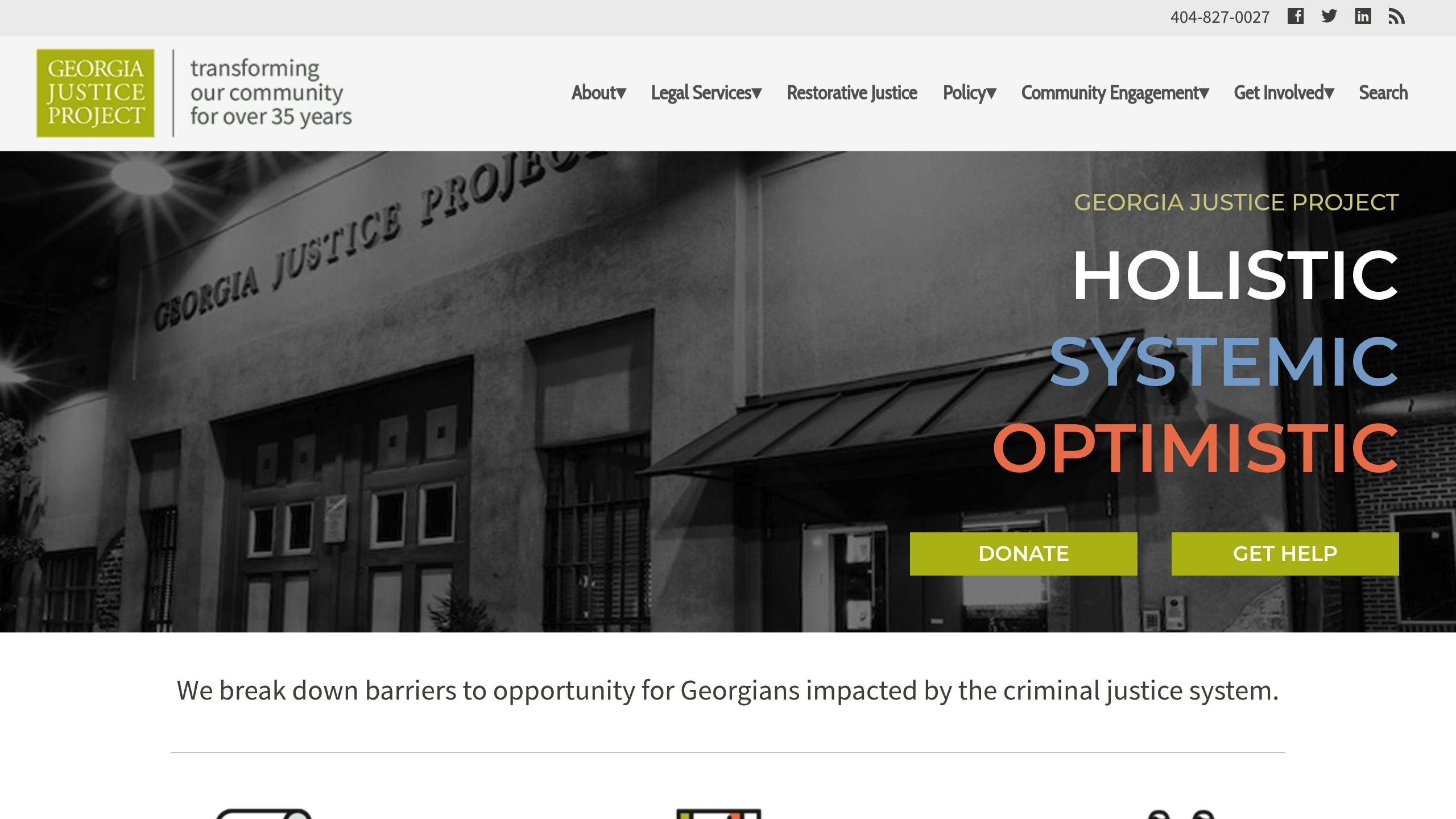
The Georgia Justice Project (GJP) offers legal aid and support to families impacted by incarceration, focusing on residents in Fulton and DeKalb counties while advocating for statewide policy changes. As one of Georgia’s longest-standing legal aid organizations, GJP works on both individual cases and broader systemic issues.
Here’s what they provide:
- Criminal Defense: Free legal representation for cases in Fulton and DeKalb counties.
- Record Restriction and Sealing: Help with Georgia’s expungement processes.
- Employment and Housing Support: Legal assistance to address barriers families face after incarceration.
These efforts tackle the employment and housing challenges often experienced by families dealing with criminal records.
If you need help with a relative’s criminal record, you can reach GJP through:
- Phone: 404.827.0027
- Email: IntakeDefense@GJP.org [4]
Cases are reviewed individually, with priority given to Fulton and DeKalb counties [4]. In 2022, GJP supported 1,748 Georgians and played a key role in passing Senate Bill 441, which allows misdemeanor records to be sealed after five conviction-free years [9].
What sets GJP apart is its blend of legal representation and social services. Their free assistance helps families navigate the challenges of the criminal justice system. Family members are also allowed to contact GJP on behalf of incarcerated relatives [4], offering a way to address legal barriers and promote family stability through Georgia-specific solutions.
2. Southern Center for Human Rights (SCHR)
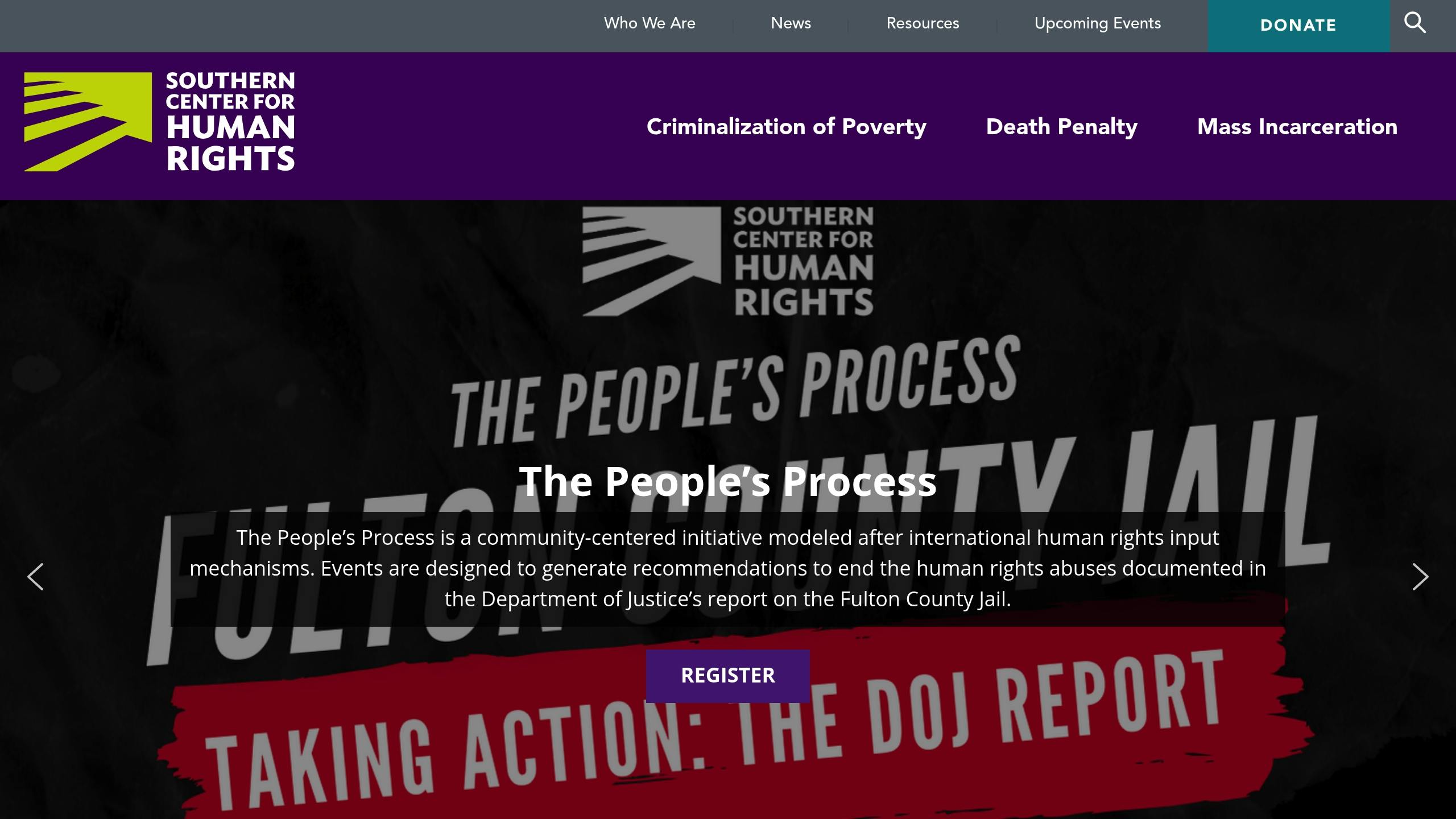
The Southern Center for Human Rights (SCHR) offers vital assistance to families dealing with Georgia’s criminal justice system. Based in Atlanta, this nonprofit works across the state, providing both litigation and advocacy services. One of its key initiatives, Fairness for Prisoners’ Families, holds monthly meetings in Atlanta and Savannah to address topics like:
- Visiting incarcerated loved ones
- Effective communication methods
- Navigating legal procedures
- Finding available support services
While organizations like GJP focus on clearing records, SCHR tackles broader issues through impactful litigation. They provide full legal representation in death penalty cases and have helped secure the release of over 50 individuals from death row [5].
SCHR’s work has also led to significant changes in Georgia’s legal landscape. For example, their 2018 class action lawsuit against Calhoun, GA, resulted in the removal of fixed bail practices for minor offenses.
How to Reach SCHR:
- Phone: (404) 688-1202 (General inquiries)
- Family Support Line: (404) 681-5576 (specific to the Fairness for Prisoners’ Families program)
- Resources: Free advocacy and re-entry guidebooks [8]
3. Georgia Legal Aid
The Georgia Legal Services Program (GLSP) offers free civil legal assistance to families affected by incarceration. Operating through 11 regional offices, GLSP serves 154 counties across Georgia. In 2022 alone, they resolved 14,519 cases, directly assisting 32,315 individuals and securing $37.8 million in benefits for their clients [12].
GLSP provides vital support to help families navigate the civil legal challenges that often arise due to incarceration. Their services cover several critical areas:
Key Services for Families:
- Assistance with child custody changes and visitation rights
- Help preventing evictions and addressing housing discrimination
- Support in accessing and maintaining public benefits
- Guidance on family reunification and reintegration
How to Get Help: Families can reach GLSP through their toll-free helpline at 1-833-GLSPLAW (1-833-457-7529) [11]. Their services are available to low-income families throughout the 154 counties they serve.
Self-Help Tools:
GLSP also provides resources for those who want to address legal issues independently, including:
- Step-by-step court forms
- Video tutorials
- LiveChat support
- Family law guides
To handle more complex cases, especially those involving family separation or reunification, GLSP partners with pro bono attorneys, expanding the reach and impact of their services [11].
4. Women on the Rise
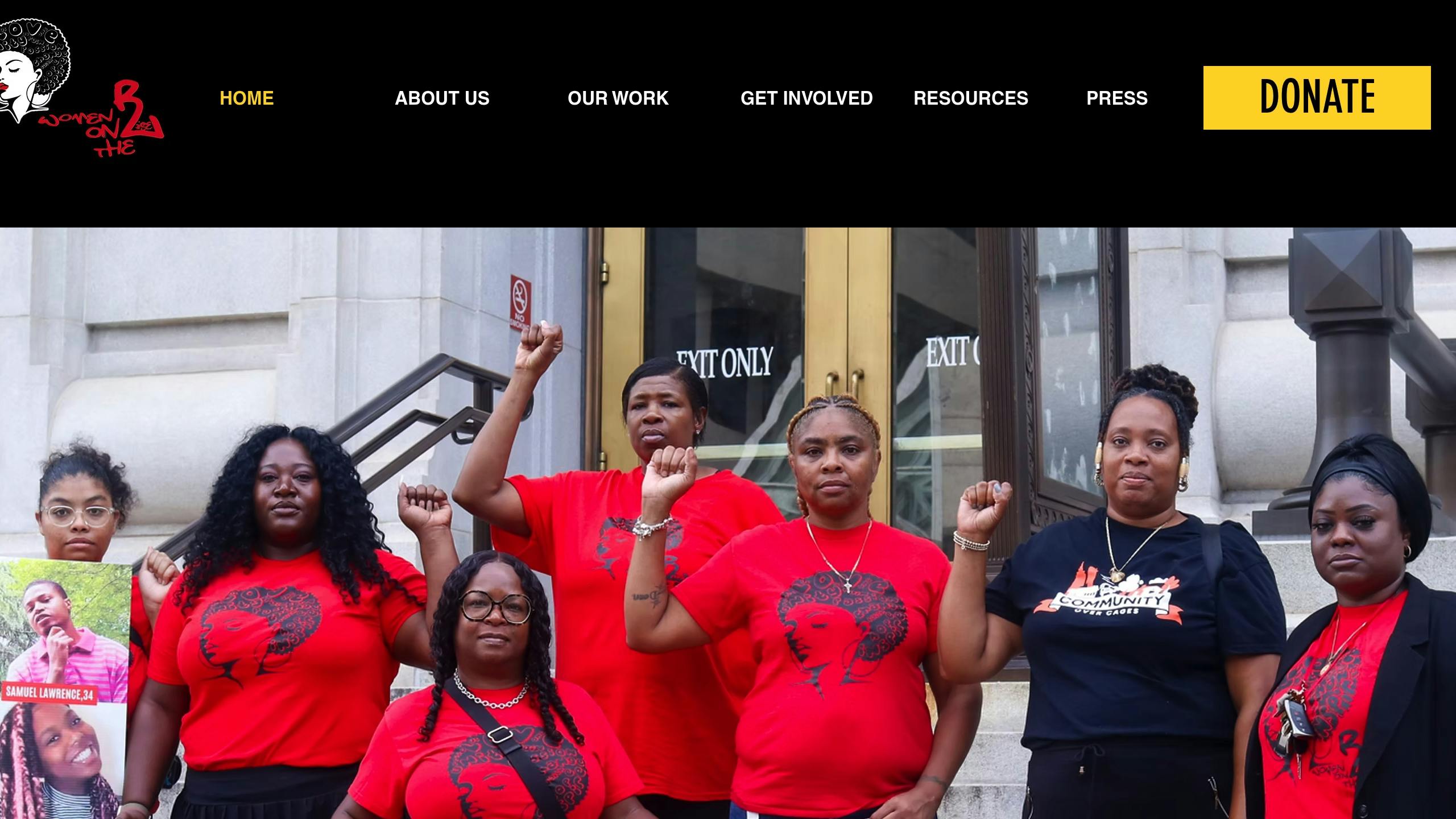
Women on the Rise, founded in Atlanta, Georgia, by Marilynn Winn in 2015, is led by women who have experienced incarceration firsthand. The organization works to tackle the legal challenges faced by women and girls in the justice system, focusing on ending mass incarceration and supporting families affected by it[14].
Key Legal Support Services:
- Advocacy for incarcerated mothers in custody cases
- Legal clinics addressing trauma and abuse histories
- Ensuring rights during visitation and family reunification[1][2]
This work is especially important in Georgia, where women’s incarceration rates skyrocketed by 248% between 1978 and 2015[10].
Mothers Offering Resources and Education (MORE) focuses on keeping families connected during incarceration by providing:
- Guidance on custody matters
- Support to maintain parent-child relationships
- Resources for caregivers looking after children[7]
Women on the Rise successfully pushed for the closure of the Atlanta City Detention Center. Their efforts led to a 9-1 city council vote to transform the facility into a Center for Equity[7].
The organization uses a trauma-informed approach, prioritizing survivors of abuse and caregivers, with a focus on:
- Addressing high rates of trauma and abuse
- Supporting primary caregivers
- Meeting women’s specific health needs[2][13]
How to Access Services: Reach out through their Atlanta office, partner organizations, or online platforms[1][3].
Their family-centered advocacy also brought about reforms like the 2014 "Ban the Box" ordinance, which removed criminal history questions from Atlanta job applications[13].
sbb-itb-7858f51
5. Georgia Prisoners’ Speak (GPS)
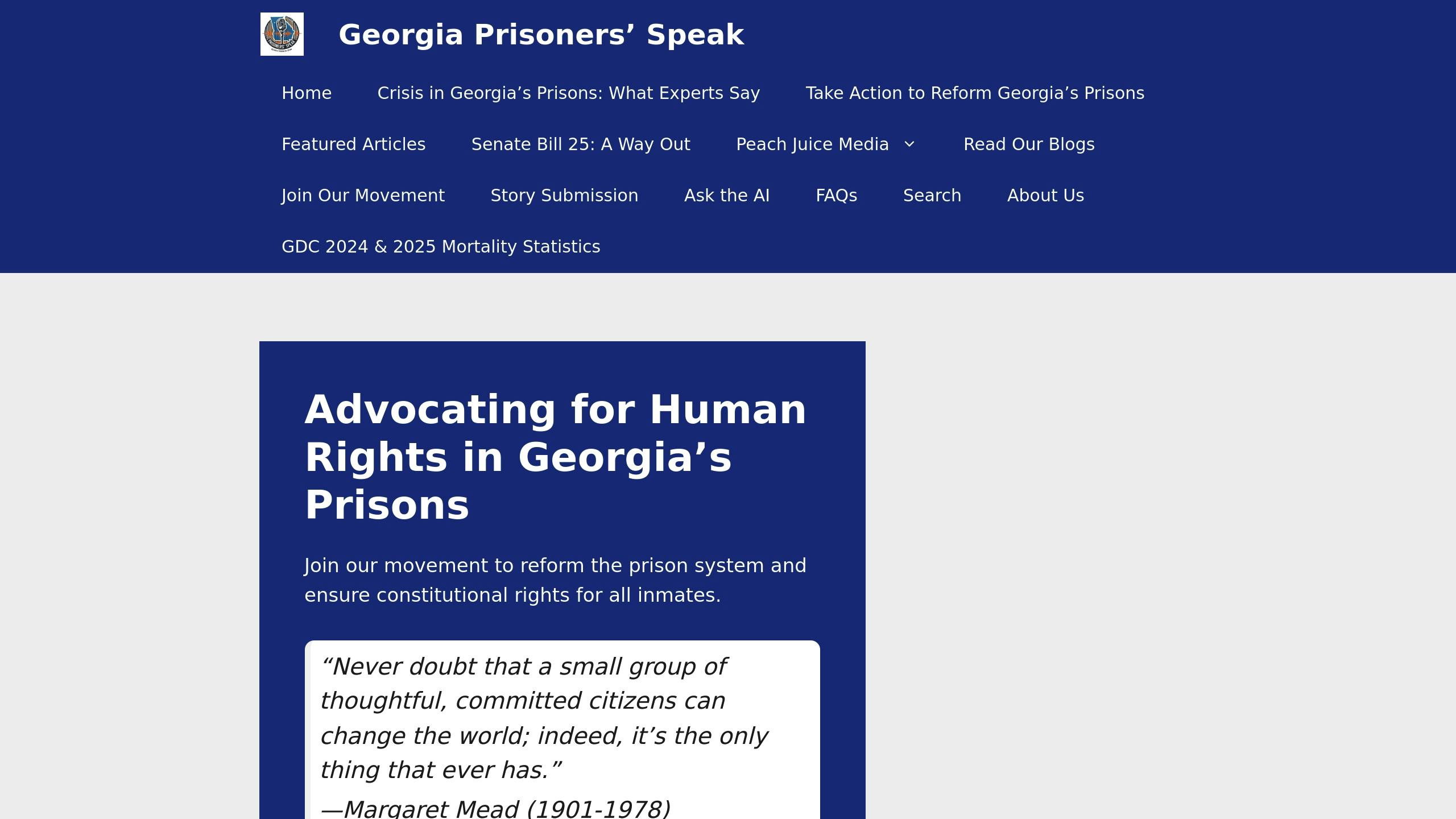
Georgia Prisoners’ Speak (GPS) is a platform that merges advocacy with practical tools to support families navigating Georgia’s prison system. While its main focus is on advocacy, GPS also offers resources to address legal challenges. Through their website, gps.press, the organization amplifies the voices of incarcerated individuals and equips families with tools to tackle pressing issues within the system[7].
Key Services Offered
GPS provides a range of advocacy and resource tools, including:
- Educational guides on prisoners’ rights and prison policies.
- Step-by-step instructions for filing complaints and grievances.
- Updates on legislation and opportunities for involvement in reform efforts[1].
The Resource Center is particularly helpful for families by offering guidance on:
- Visitation rules and procedures.
- How to use official complaint systems effectively.
- Monitoring and reporting on prison conditions.
The platform encourages families to take an active role in addressing prison challenges. It provides support in areas like:
- Documenting Conditions: Tools to record and report potential violations within prisons[1].
- Building Connections: Access to specialists focused on prisoner rights and legal support[1].
- Advocacy Tools: Resources to help families communicate effectively with officials and push for change[1].
Accessible Digital Tools
GPS’s online platform is available 24/7, offering access to prison condition reports, updates on reform campaigns, and advocacy resources – all designed to help families stay informed and engaged[6].
Get Involved
Families can visit gps.press to explore free resources, share their experiences, and join advocacy campaigns. The platform also fosters a sense of community by connecting families with others facing similar challenges and providing opportunities to participate in awareness initiatives[6].
6. ACLU of Georgia
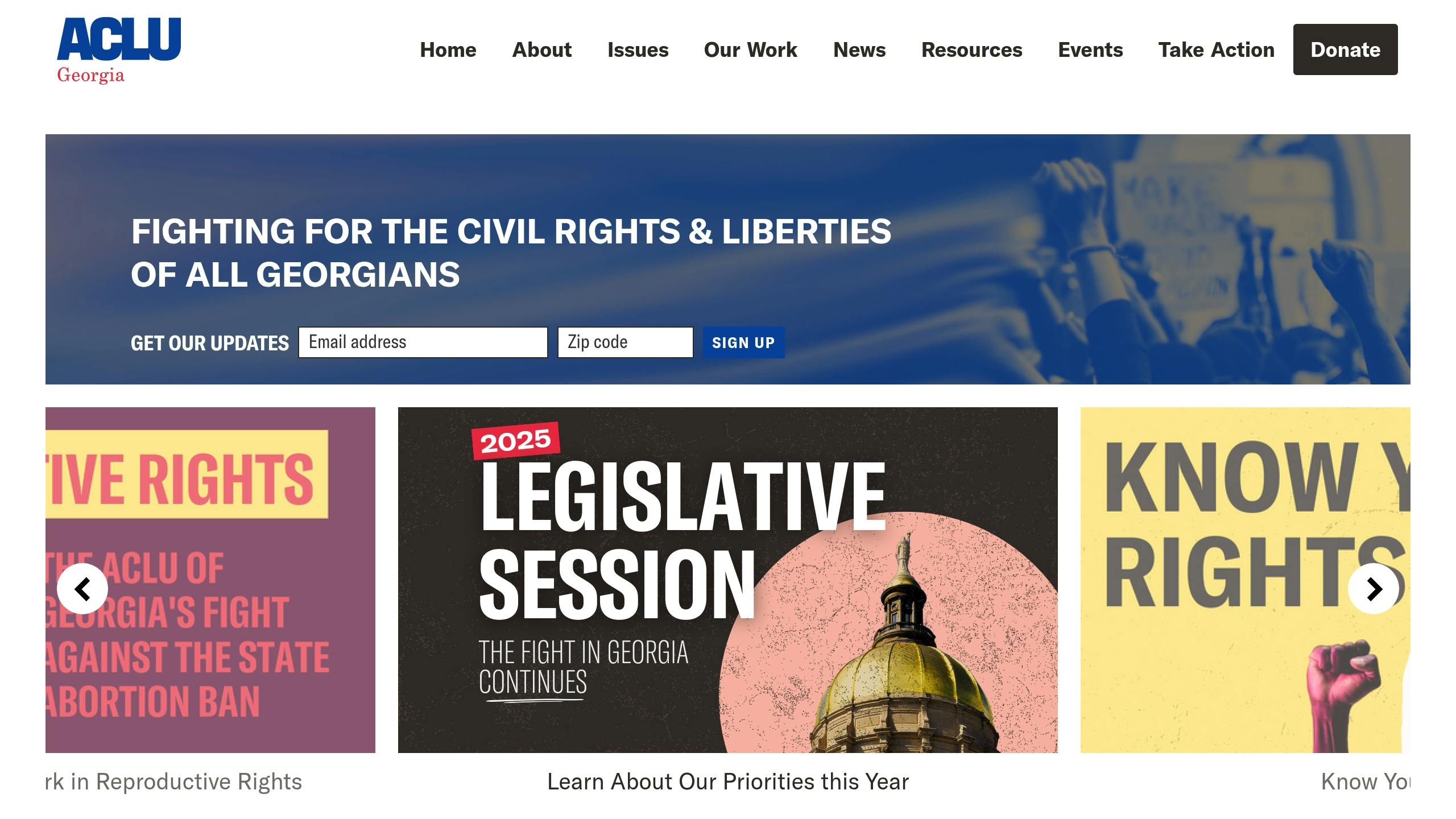
The ACLU of Georgia combines legal services with efforts to create long-term change, focusing on protecting constitutional rights for families across the state.
Core Legal Services
The organization offers support through:
- Direct legal representation in prisoners’ rights cases
- Know Your Rights workshops held statewide
Contact: 770.303.8111 | info@acluga.org | Online intake available at acluga.org
Smart Justice Initiative
The Smart Justice Georgia campaign tackles issues within the criminal justice system, aiming to reduce mass incarceration. Advocates estimate these reforms could save Georgia taxpayers around $859 million annually[6].
Family Support Programs
Key areas of focus include:
- Contesting unconstitutional visitation restrictions
- Promoting child-friendly policies in prisons
- Defending custody rights for incarcerated parents
Recent Impact
"The ACLU of Georgia’s emergency lawsuit in April 2020 (Jones v. Hill) resulted in a federal court order mandating COVID-19 protections for medically vulnerable detainees at Clayton County Jail, leading to improved conditions and the release of at-risk individuals." – ACLU of Georgia Annual Report, 2020
This lawsuit also ensured that incarcerated individuals could maintain communication with their families during pandemic-related lockdowns.
Educational Resources
The ACLU of Georgia offers:
- Know Your Rights guides tailored for incarceration-related situations
- Updates on legislative changes impacting family rights
Getting Help
The organization focuses on cases with the potential to drive systemic change, particularly those involving constitutional violations or discrimination. Families seeking assistance can use the online intake form at acluga.org.
7. Impact Justice AI
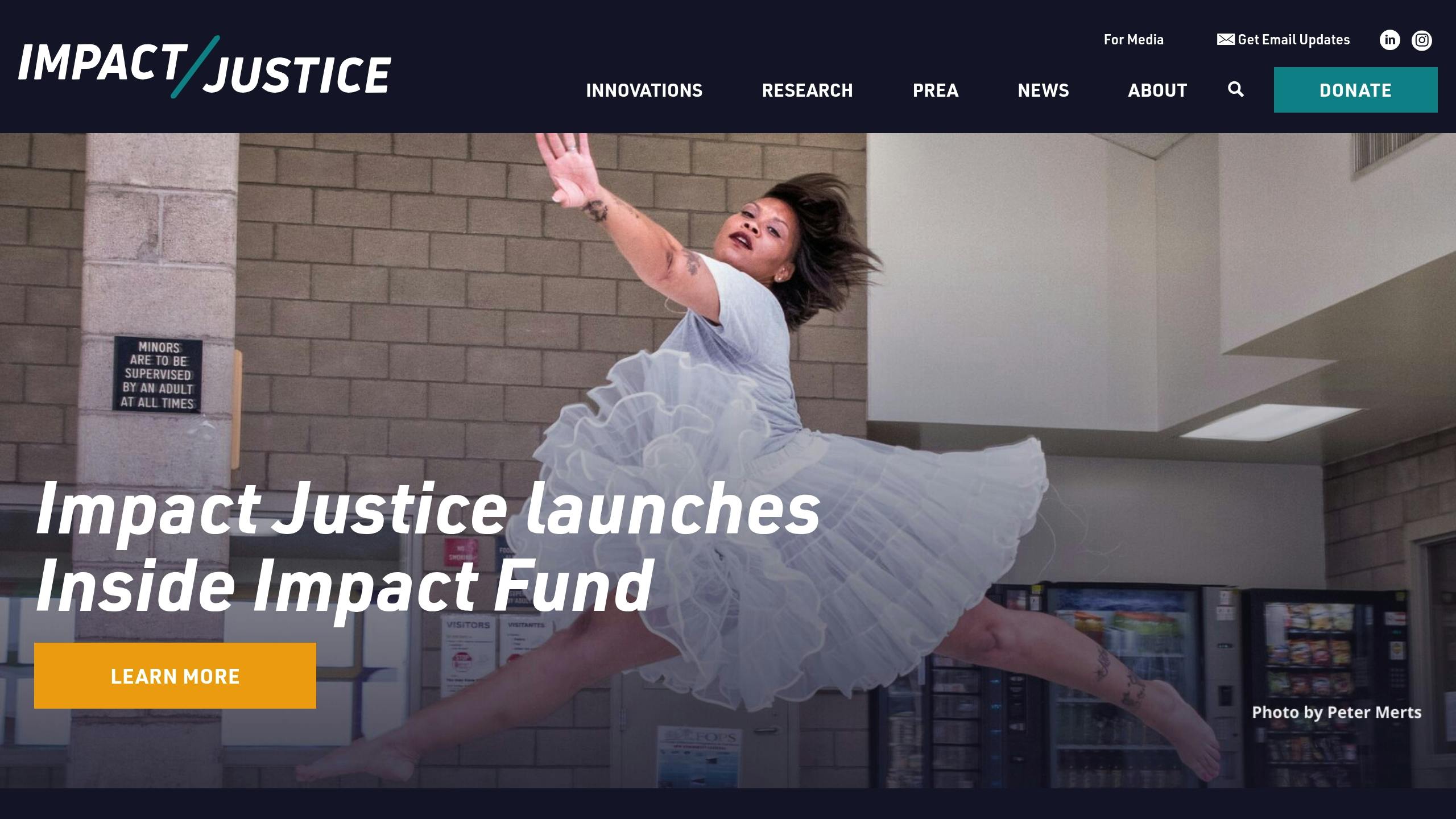
Impact Justice AI (impactjustice.ai) is transforming legal aid in Georgia by offering AI-powered tools that bolster advocacy efforts and streamline legal processes.
Key Features
This platform supports legal services with:
- Automated updates to track case progress
- Tools for preparing legal documents automatically
- Georgia-focused legal analysis capabilities
- Visual data displays to highlight systemic trends
Results and Achievements
In 2024, Impact Justice AI played a role in over 5,000 cases in Georgia. It cut case review times by 62% and pinpointed actionable legal issues in 73% of the cases it reviewed [8][15].
Collaborative Efforts
The platform works closely with Georgia’s legal aid organizations by:
- Offering shared training sessions
- Coordinating case referrals
- Conducting joint data analysis projects
How to Access
You can get started with Impact Justice AI by:
- Signing up directly on their website at impactjustice.ai
- Receiving a referral through advocacy groups
Organization Comparison
When deciding on support, it’s important to understand the differences between organizations. Here’s a quick overview:
| Organization | Focus Area | Services Offered | Key Areas of Expertise | Contact |
|---|---|---|---|---|
| Georgia Justice Project (GJP) | Criminal Defense & Reentry | Criminal defense, record clearing, policy advocacy | Specializes in reentry services | |
| Southern Center for Human Rights (SCHR) | Systemic Reform | Impact litigation, addressing prison conditions, death penalty cases | Focuses on systemic change | |
| Georgia Legal Aid | Civil Legal Services | Family law, housing issues, public benefits | Offers wide-ranging civil legal support | |
| Women on the Rise | Gender-Specific Support | Reentry services, family reunification, leadership programs | Supports women in reentry processes | |
| Georgia Prisoners’ Speak (GPS) | Prison Reform Advocacy | Exposing prison conditions, constitutional rights advocacy, public awareness campaigns | Gives prisoners a platform to share their stories | |
| ACLU of Georgia | Civil Rights | Constitutional rights advocacy, strategic litigation, “Know Your Rights” workshops | Defends civil liberties | |
| Impact Justice AI | Tech-Driven Advocacy | Case tracking, document automation, legal analysis | Uses technology to improve legal processes |
Service Coverage
Each organization serves different areas and populations. For example, GJP primarily works in metro Atlanta, while Georgia Legal Aid extends its services to rural counties via regional offices.
Measuring Impact
The way organizations measure their success also varies. GJP focuses on legislative changes, SCHR works on precedent-setting cases, and Georgia Legal Aid emphasizes resolving individual cases.
Collaboration in Action
Some organizations team up to tackle tough challenges. For instance, Women on the Rise and GJP collaborate to address family court issues, combining their expertise to better serve families.
Specialized Family Support
Here are some unique ways these organizations assist families:
- GJP: Helps restore parental rights.
- GPS: Provides a platform for prisoners to share their experiences.
- ACLU of Georgia: Offers workshops on visitation rights.
This breakdown can guide families in finding the right organization for their specific needs.
Next Steps
Once you’ve identified the right organization from the comparison table, it’s time to take action and seek legal support. Here’s how to get started.
Gather Essential Documents
Before reaching out, collect these key documents to make the process smoother:
- GCIC reports
- Court documents
- Proof of income
- Chronology of key events
Starting the Process
A great way to begin is by attending Georgia Justice Project’s "First Fridays" program. These monthly sessions explain available services and guide you through the application process. To register, contact GJP at 404.827.0027 ext. 231 or email IntakeDefense@GJP.org.
Useful Resources
| Action | Resource |
|---|---|
| Learn the basics | GJP’s First Fridays |
| Complete forms | Impact Justice AI |
| Join a community | GPS/Women on the Rise |
Using AI Tools for Legal Support
Impact Justice AI offers Georgia-specific tools to help you:
- Track your case’s progress
- Simplify document preparation
These tools can save time and help you stay organized.
Handling Urgent Situations
If you’re facing tight deadlines or urgent issues:
- Call Georgia Legal Aid’s emergency line
- Request priority review from SCHR
- Clearly outline any imminent deadlines when contacting organizations
Building a Support Network
While navigating the legal process, consider connecting with Georgia Prisoners’ Speak. They can help you:
- Build connections with others in similar situations
- Collect additional evidence to strengthen your case
- Stay updated on broader reform efforts
Follow Up
If you don’t receive a response within the expected timeframe, follow up with the organization to check on the status of your request.
Exploring Alternative Options
If your initial efforts don’t work out, consider these alternatives:
- Ask for specific reasons if your request is denied
- Inquire about appeal options
- Reach out to law school clinics for assistance
- Contact local bar associations for pro bono referrals
FAQs
How to get a lawyer for free in Georgia?
If you’re facing legal issues related to incarceration in Georgia, there are several resources available to help:
-
Georgia Legal Services Program
This program assists individuals in 154 counties outside Metro Atlanta. To qualify, your household income must fall under $37,500 per year for a family of four (based on 2023 guidelines). You can apply or learn more at www.GeorgiaLegalAid.org [10]. -
Specialized Advocacy Groups
- Georgia Justice Project: Focuses on criminal record issues and reentry support.
- Southern Center for Human Rights: Addresses prison conditions and systemic legal concerns.
- ACLU Georgia: Handles matters related to constitutional rights and visitation policies.
-
Volunteer Lawyer Programs
The State Bar of Georgia and local bar associations offer free legal representation through volunteer programs. Eligibility often depends on your income, and referral services are available [7].
These organizations specialize in different areas, such as family reunification, prison conditions, and reentry support. For urgent cases, many provide quick intake processes through their websites or hotlines.
